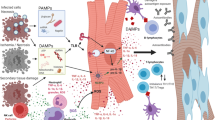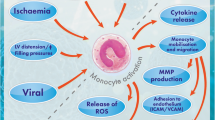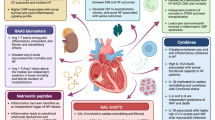Abstract
Chronic inflammation underlies a variety of seemingly unrelated conditions including coronary artery disease. The interest in exploring the role of inflammation in heart failure (CHF) arises from earlier observations that circulating pro-inflammatory biomarker levels are elevated in patients with both ischaemic and non-ischaemic cardiomyopathies and correlate with severity of disease and prognosis (McMurray et al. in Eur Heart J 33:1787–1847, 2012; Mosterd and Hoes in Heart 93:1137–1146, 2007; Owan et al. in New Engl J Med 355:251–259, 2006). In acute decompensated HF, pro-inflammatory biomarker levels have been associated with mortality and readmission rates (Cowie et al. in Heart 83:505–510, 2000). Similar to neurohormonal activation and inflammation, production of pro-inflammatory cytokines is a response to stress in an attempt to restore cellular function. However, sustained expression and exposure to cytokines can lead to left ventricular dysfunction, negative inotropic effects, altered cardiac metabolism, myocardial remodelling and HF progression. However, it is unclear whether elevated levels of pro-inflammatory biomarkers, such as high-sensitivity C-reactive protein, signify an ongoing inflammatory process that leads to HF progression, or are merely markers of advanced disease. Beta-blockers, renin–angiotensin–aldosterone axis antagonists, statins and immunosuppressants have been found to decrease the levels of cytokines in small clinical studies of patients with HF (Hobbs et al. in Heart J 28:1128–1134, 2007). However, ‘immunomodulatory’ approaches applied in the RECOVER, RENAISSANCE, ATTACH, IMAC and ACCLAIM double-blind, placebo-controlled studies had neutral or negative effects on outcomes of patients with HF. In the present review, we focus on the role of inflammation in pathogenesis and progression of the HF, the value of pro-inflammatory cytokines as biomarkers and the potential therapeutic applications of immunomodulation in HF patients.

Similar content being viewed by others
References
McMurray JJ, Adamopoulos S, Anker SD, Auricchio A, Böhm M, Dickstein K et al (2012) ESC Guidelines for the diagnosis and treatment of acute and chronic heart failure 2012. Eur Heart J 33:1787–1847
Mosterd A, Hoes AW (2007) Clinical epidemiology of heart failure. Heart 93:1137–1146
Owan TE, Hodge DO, Herges RM, Jacobsen SJ, Roger VL, Redfield MM (2006) Trends in prevalence and outcome of heart failure with preserved ejection fraction. New Engl J Med 355:251–259
Cowie MR, Wood DA, Coats AJ, Thompson SG, Suresh V, Poole-Wilson PA et al (2000) Survival of patients with a new diagnosis of heart failure: a population based study. Heart 83:505–510
Hobbs FD, Roalfe AK, Davis RC, Davies MK, Hare R, Midlands Research Practices Consortium (MidReC) (2007) Prognosis of all-cause heart failure and borderline left ventricular systolic dysfunction: 5 year mortality follow-up of the Echocardiographic Heart of England Screening Study (ECHOES). Eur Heart J 28:1128–1134
Frangogiannis NG (2012) Regulation of the inflammatory response in cardiac repair. Circ Res 110(1):159–173
Entman ML, Michael L, Rossen RD, Dreyer WJ, Anderson DC, Taylor AA, Smith CW (1991) Inflammation in the course of early myocardial ischemia. Faseb J 11:2529–2537
Frangogiannis NG (2014) The immune system and the remodeling infarcted heart: cell biological insights and therapeutic opportunities. J Cardiovasc Pharmacol 63(3):185–195
Mill JG, Stefanon I, dos Santos L, Baldo MP (2011) Remodeling in the ischemic heart: the stepwise progression for heart failure. Brazil J Med Biol Res 44:890–898
Dobaczewski M, Gonzalez-Quesada C, Frangogiannis NG (2010) The extracellular matrix as a modulator of the inflammatory and reparative response following myocardial infarction. J Mol Cell Cardiol 48:504–511
Timmers L, Pasterkamp G, de Hoog VC, Arslan F, Appelman Y, de Kleijn DP (2012) The innate immune response in reperfused myocardium. Cardiovasc Res 94(2):276–283
Tousoulis D, Papageorgiou N, Briasoulis A, Androulakis E, Charakida M, Tsiamis E et al (2012) Conflicting effects of nitric oxide and oxidative stress in chronic heart failure: potential therapeutic strategies. Heart Fail Rev 17:65–79
Ishida H, Ichimori K, Hirota Y, Fukahori M, Nakazawa H (1996) Peroxynitrite-induced cardiac myocyte injury. Free Radic Biol Med 20:343–350
Cotton JM, Kearney MT, Shah AM (2002) Nitric oxide and myocardial function in heart failure: friend or foe? Heart 88:564–566
Elahi MM, Naseem KM, Matata BM (2007) Nitric oxide in blood. The nitrosative-oxidative disequilibrium hypothesis on the pathogenesis of cardiovascular disease. FEBS J 274:906–923
Timmers L, Sluijter JP, van Keulen JK, Hoefer IE, Nederhoff MG, Goumans MJ et al (2008) Toll-like receptor 4 mediates maladaptive left ventricular remodeling and impairs cardiac function after myocardial infarction. Circ Res 102:257–264
Arslan F, Smeets MB, O’Neill LA, Keogh B, McGuirk P, Timmers L et al (2010) Myocardial ischemia/reperfusion injury is mediated by leukocytic toll-like receptor-2 and reduced by systemic administration of a novel anti-toll-like receptor-2 antibody. Circulation 121:80–90
Hill JH, Ward PA (1971) The phlogistic role of C3 leukotactic fragments in myocardial infarcts of rats. J Exp Med 133(4):885–900
Brasier AR (2006) The NF-κB regulatory network. Cardiovasc Toxicol 6(2):111–130
Gilmore TD (2006) Introduction to NF-κB: players, pathways, perspective. Oncogene 25(51):6680–6684
Mattiazzi A, Bassani RA, Escobar AL, Palomeque J, Valverde CA, Petroff MV et al (2015) Chasing cardiac physiology and pathology down the CaMKII cascade. Am J Physiol Heart Circ Physiol 308(10):H1177–H1191
Bujak M, Frangogiannis NG (2009) The role of IL-1 in the pathogenesis of heart disease. Arch Immunol Ther Exp 57(3):165–176 (Warsz)
Mezzaroma E, Toldo S, Farkas D, Seropian IM, Van Tassell BW, Salloum FN et al (2011) The inflammasome promotes adverse cardiac remodelling following acute myocardial infarction in the mouse. Proc Natl Acad Sci USA 108(49):19725–19730
Frangogiannis NG, Lindsey ML, Michael LH, Youker KA, Bressler RB, Mendoza LH et al (1998) Resident cardiac mast cells degranulate and release preformed TNF-α, initiating the cytokine cascade in experimental canine myocardial ischemia/reperfusion. Circulation 98(7):699–710
Hamid T, Gu Y, Ortines RV, Bhattacharya C, Wang G, Xuan YT et al (2009) Divergent tumor necrosis factor receptor-related remodeling responses in heart failure: role of nuclear factor-κB and inflammatory activation. Circulation 119(10):1386–1397
Kobara M, Noda K, Kitamura M, Okamoto A, Shiraishi T, Toba H et al (2010) Antibody against interleukin-6 receptor attenuates left ventricular remodelling after myocardial infarction in mice. Cardiovasc Res 87(3):424–430
Corada M, Chimenti S, Cera MR, Vinci M, Salio M, Fiordaliso F et al (2005) Junctional adhesion molecule-A-deficient polymorphonuclear cells show reduced diapedesis in peritonitis and heart ischemia-reperfusion injury. Proc Natl Acad Sci USA 102(30):10634–10639
Dewald O, Zymek P, Winkelmann K, Koerting A, Ren G, Abou-Khamis T et al (2005) CCL2/monocyte chemoattractant protein-1 regulates inflammatory responses critical to healing myocardial infarcts. Circ Res 96(8):881–889
Frangogiannis NG (2007) Chemokines in ischemia and reperfusion. Thromb Haemost 97(5):738–747
Williams MR, Azcutia V, Newton G, Alcaide P, Luscinskas FW (2011) Emerging mechanisms of neutrophil recruitment across endothelium. Trends Immunol 32(10):461–469
Spinale FG (2007) Myocardial matrix remodeling and the matrix metalloproteinases: influence on cardiac form and function. Physiol Rev 87:1285–1342
Letavernier E, Zafrani L, Perez J, Letavernier B, Haymann JP, Baud L (2012) The role of calpains in myocardial remodelling and heart failure. Cardiovasc Res 96(1):38–45
Pfeffer MA, Pfeffer JM, Steinberg C, Finn P (1985) Survival after an experimental myocardial infarction: beneficial effects of longterm therapy with captopril. Circulation 72:406–412
Gullestad L, Aukrust P, Ueland T et al (1999) Effect of high- versus low-dose angiotensin converting enzyme inhibition on cytokine levels in chronic heart failure. J Am Coll Cardiol 34:2061–2067
White M, Lepage S, Lavoie J, De Denus S, Leblanc MH, Gossard D et al (2007) Effects of combined candesartan and ACE inhibitors on BNP, markers of inflammation and oxidative stress, and glucose regulation in patients with symptomatic heart failure. J Card Fail 13(2):86–94
Kawaguchi M, Takahashi M, Hata T, Kashima Y, Usui F, Morimoto H et al (2011) Inflammasome activation of cardiac fibroblasts is essential for myocardial ischemia/reperfusion injury. Circulation 123(6):594–604
Sun Y, Weber KT (1996) Angiotensin converting enzyme and myofibroblasts during tissue repair in the rat heart. J Mol Cell Cardiol 28:851–858
Albelda SM, Smith CW, Ward PA (1994) Adhesion molecules and inflammatory injury. Faseb J 8(8):504–512
Metzler B, Mair J, Lercher A, Schaber C, Hintringer F, Pachinger O et al (2001) Mouse model of myocardial remodelling after ischemia: role of intercellular adhesion molecule-1. Cardiovasc Res 49(2):399–407
Swirski FK, Nahrendorf M, Etzrodt M, Wildgruber M, Cortez-Retamozo V, Panizzi P et al (2009) Identification of splenic reservoir monocytes and their deployment to inflammatory sites. Science 325(5940):612–616
Jung K, Kim P, Leuschner F, Gorbatov R, Kim JK, Ueno T et al (2013) Endoscopic time-lapse imaging of immune cells in infarcted mouse hearts. Circ Res 112(6):891–899
Frangogiannis NG, Mendoza LH, Ren G, Akrivakis S, Jackson PL, Michael LH et al (2003) MCSF expression is induced in healing myocardial infarcts and may regulate monocyte and endothelial cell phenotype. Am J Physiol Heart Circ Physiol 285(2):H483–H492
dos Santos L, Santos AA, Gonçalves GA, Krieger JE, Tucci PJ (2010) Bone marrow cell therapy prevents infarct expansion and improves border zone remodeling after coronary occlusion in rats. Int J Cardiol 145:34–39
Wencker D, Chandra M, Nguyen K, Miao W, Garantziotis S, Factor SM et al (2003) A mechanistic role for cardiac myocyte apoptosis in heart failure. J Clin Invest 111:1497–1504
Jiang L, Huang Y, Hunyor S, dos Remedios CG (2003) Cardiomyocyte apoptosis is associated with increased wall stress in chronic failing left ventricle. Eur Heart J 24:742–751
Pereira RB, Sartório CL, Vassallo DV, Stefanon I (2005) Differences in tail vascular bed reactivity in rats with and without heart failure following myocardial infarction. J Pharmacol Exp Ther 312:1321–1325
Kerr JF, Wyllie AH, Currie AR (1972) Apoptosis: a basic biological phenomenon with wide-ranging implications in tissue kinetics. Br J Cancer 26:239–257
Kubota T, McTiernan CF, Frye CS, Slawson SE, Lemster BH, Koretsky AP et al (1997) Dilated cardiomyopathy in transgenic mice with cardiac-specific overexpression of tumor necrosis factor-alpha. Circ Res 81:627–635
Gustafsson AB, Gottlieb RA (2007) Bcl-2 family members and apoptosis, taken to heart. Am J Physiol Cell Physiol 292:C45–C51
Hochhauser E, Kivity S, Offen D, Maulik N, Otani H, Barhum Y et al (2003) Bax ablation protects against myocardial ischemia-reperfusion injury in transgenic mice. Am J Physiol Heart Circ Physiol 284:H2351–H2359
Nakayama H, Chen X, Baines CP, Klevitsky R, Zhang X, Zhang H et al (2007) Ca2+- and mitochondrial-dependent cardiomyocyte necrosis as a primary mediator of heart failure. J Clin Invest 117:2431–2444
Golstein P, Kroemer G (2007) Cell death by necrosis: towards a molecular definition. Trends Biochem Sci 32:37–43
Smith CC, Davidson SM, Lim SY, Simpkin JC, Hothersall JS, Yellon DM (2007) Necrostatin: a potentially novel cardioprotective agent? Cardiovasc Drugs Ther 21:227–233
van Rooij E, Sutherland LB, Liu N, Williams AH, McAnally J, Gerard RD et al (2006) A signature pattern of stress-responsive microRNAs that can evoke cardiac hypertrophy and heart failure. Proc Natl Acad Sci USA 103:18255–18260
Orogo AM, Gustafsson ÅB (2013) Cell death in the myocardium: my heart won’t go on. IUBMB Life 65(8):651–656
Han M, Toli J, Abdellatif M (2011) MicroRNAs in the cardiovascular system. Curr Opin Cardiol 26:181–189
Tang Y, Zheng J, Sun Y, Wu Z, Liu Z, Huang G (2009) MicroRNA-1 regulates cardiomyocyte apoptosis by targeting Bcl-2. Int Heart J 50(3):377–387
Chen JF, Murchison EP, Tang R, Callis TE, Tatsuguchi M, Deng Z et al (2008) Targeted deletion of Dicer in the heart leads to dilated cardiomyopathy and heart failure. Proc Natl Acad Sci USA 105:2111–2116
Levine B, Kalman J, Mayer L, Fillit HM, Packer M (1990) Elevated circulating levels of tumor necrosis factor in severe chronic heart failure. New Engl J Med 323:236–241
Mann DL (2002) Inflammatory mediators and failing heart: past, present, and the foreseeable future. Circ Res 91:988–998
Albert MA, Danielson E, Rifai N, Ridker PM, PRINCE Investigators (2001) Effect of statin therapy on C-reactive protein levels: the pravastatin inflammation/CRP evaluation (PRINCE): a randomized trial and cohort study. JAMA 286:64–70
Dichtl W, Dulak J, Frick M et al (2003) HMG-CoAreductase inhibitors regulate inflammatory transcription factors in human endothelial and vascular smooth muscle cells. Arterioscler Thromb Vasc Biol 23:58–63
Hakamada-Taguchi R, Uehara Y, Kuribayashi K et al (2003) Inhibition of hydroxymethylglutaryl-coenzyme a reductase reduces Th1 development and promotes Th2 development. Circ Res 93:948–956
Gissi-HfInvestigators (2008) Effect of rosuvastatin in patients with chronic heart failure (the GISSI-HF trial): a randomised, double-blind, placebo-controlled trial. Lancet 372(9645):1231–1239
Kjekshus J, Apetrei E, Barrios V et al (2009) Rosuvastatin in older patients with systolic heart failure. New Engl J Med 357:2248–2261
McMurray JJ, Kjekshus J, Gullestad L, Dunselman P, Hjalmarson A, Wedel H et al (2009) Effects of statin therapy according to plasma high-sensitivity C-reactive protein concentration in the Controlled Rosuvastatin Multinational Trial in Heart Failure (CORONA): a retrospective analysis. Circulation 120:2188–2196
Deswal A, Bozkurt B, Seta Y et al (1999) Safety and efficacy of a soluble p75 tumor necrosis factor receptor (Enbrel, Etanercept) in patients with advanced heart failure. Circulation 99:3224–3226
Anker SD, Coats AJSV (2002) How to recover from RENAISSANCE? The significance of the results from of RECOVER, RENAISSANCE, RENEWAL and ATTACH. Int J Cardiol 86:123–130
Lisman KA, Stetson SJ, Koerner MM et al (2002) The role of tumor necrosis factor alpha blockade in the treatment of congestive heart failure. Congest Heart Fail 8:275–279
Kadokami T, McTiernan CF, Kubota T et al (2001) Effects of soluble TNF receptor treatment on lipopolysaccharide-induced myocardial cytokine expression. Am J Physiol 280:H2281–H2291
Gullestad L, Aass H, Fjeld JG et al (2001) Immunomodulating therapy with intravenous immunoglobulin in patients with chronic heart failure. Circulation 103:220–225
McNamara DM, Holubkov R, Starling RC et al (2001) Controlled trial of intravenous immune globulin in recent-onset dilated cardiomyopathy. Circulation 103:2254–2259
Torre-Amione G, Anker SD, Bourge RC, Colucci WS, Greenberg BH, Hildebrandt P, Keren A et al (2008) Results of a nonspecific immunomodulation therapy in chronic heart failure (ACCLAIM trial): a placebo-controlled randomised trial. Lancet 371:228–236
Author information
Authors and Affiliations
Corresponding author
Ethics declarations
Conflicts of interest
None.
Rights and permissions
About this article
Cite this article
Briasoulis, A., Androulakis, E., Christophides, T. et al. The role of inflammation and cell death in the pathogenesis, progression and treatment of heart failure. Heart Fail Rev 21, 169–176 (2016). https://doi.org/10.1007/s10741-016-9533-z
Published:
Issue Date:
DOI: https://doi.org/10.1007/s10741-016-9533-z




